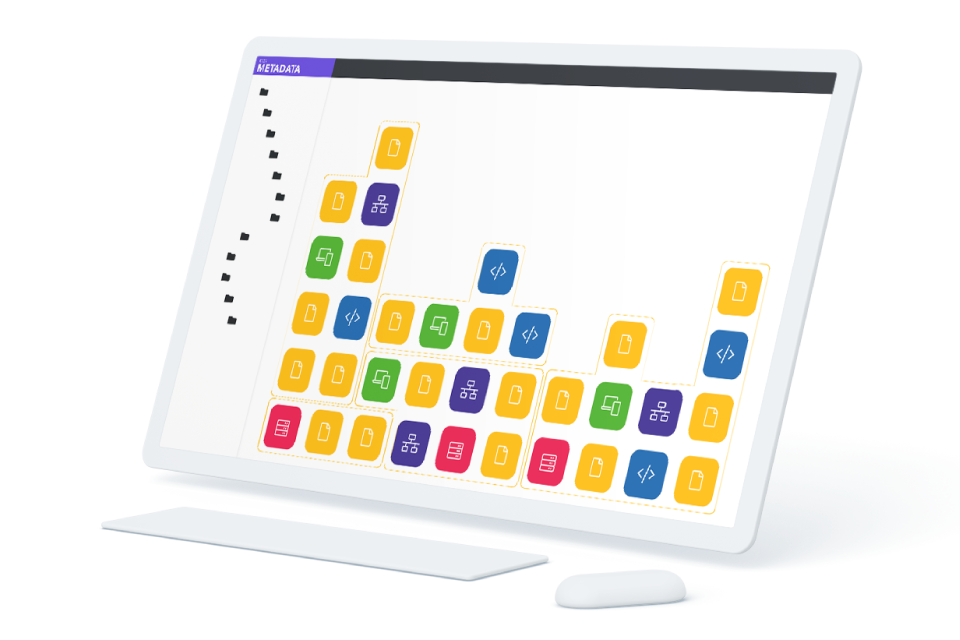About the product
CEOS MetaDatais a software tool used to automatically manage business metadata. Their continuous data mining, visualisation, interpretation of relations, business glossary building, and data catalogue compiling allow you to better understand and effectively manage even the most expansive IT systems.
System complexity, interdependence, and insufficient documentation cause problems that can be summarised as follows: expensive and long-term development, higher error rates, problems with business continuity, and insufficient documentation.
CEOS MetaData is a tool to help you uncover these problems and gradually eliminate them.

Main advantages
Lower development costs
CEOS MetaData enables companies developing information systems to reduce costs by up to 50 %.
Nowadays, it often happens to companies that a very complex and expensive problem ultimately arises from an initially simple development demand. And with an ever-increasing number of system components, this problem is only growing. According to the analysis, the programmer is forced to read 10 lines when writing 1 line of code in order to understand the data flow and functionality of the system. This step makes it very expensive and delays the delivery of new functionalities.
Business continuity
When a key worker leaves, knowledge is often not fully passed down to the new worker. However, since CEOS MetaData allows you to see the links between objects (impact analysis) and individual versions of changes, finding and documenting all the changes that the employee has ever implemented and then commenting on them is not a problem.
LOWER ERROR RATE DURING DEVELOPMENT THANKS TO A QUALITY IMPACT ANALYSIS
You can thus avoid situations where modifying a part of the program disables another system component that at first glance seems unrelated to the change. Such a complication does not necessarily arise through the fault of the programmer, as this link could have made someone else's job easier. A good impact analysis will reveal this link and alert the programmer to it.
AUTOMATIC SYSTEM DOCUMENTATION
Data on changes made will be stored in the database so that the user can work with it at any time. They will be able to use all the commands they used when working with the data. Thanks to the constant downloading of metadata, changes (insert, update, delete) are automatically saved in past versions so that the user can go back in time and see what has changed. They will also be able to save notes on individual objects, tag them, group them, and then visualise everything.
HOW TO SET UP CEOS METADATA
consultation with the customer
data extractor settings?
display and control data
user role settings, access, and automation
ontology configuration?
perspective settings?
testing, customer process set-up, and training
handover
| Microsoft | Oracle | IBM | Informatica | Ataccama | Collibra | Manta | CMD | |
| Semantic categorisation and visualisation | ||||||||
| Dynamic categorisation and perspectives | no | no | no | no | no | no | no | ano |
| Switching and combining perspectives | ne | ne | omezeně | omezeně | omezeně | ne | no | ano |
| Manual interventions in the model | yes | yes | yes | yes | yes | yes | no | yes |
| Metadata enrichment | ||||||||
| General interface | yes | yes | yes | yes | yes | yes | no | yes |
| Plugins / Extensions | no | no | no | no | no | no | no | yes |
| Machine Learning | no | yes | yes | yes | yes | no | no | yes |
| Comprehensive search |
||||||||
| Combination of full-text and special conditions | omezeně | omezeně | yes | yes | yes | omezeně | omezeně | yes |
| Search by typology | no | no | no | no | no | no | no | yes |
| Pattern search | no | no | no | no | no | no | no | yes |
| Expandability | ||||||||
| Custom repository model | no | no | no | no | no | no | no | yes |
| Funcionality, plugin | no | no | no | no | no | no | no | yes |
| Automation | no | no | no | no | no | no | no | yes |
| Version control and change identification |
||||||||
| Slice timing | no | no | no | no | no | no | no | yes |
| Visualisation of changes | no | no | no | no | no | no | no | yes |
| Change management |
no | no | no | no | no | no | no | yes |
| OpenSource |
no | no | no | no | no | no | no | yes |
Případové studie
Případová studie 1
Lorem ipsum dolor sit amet, consectetuer adipiscing elit, sed diam nonummy nibh euismod tincidunt ut laoreet dolore magna aliquam erat volutpat. Ut wisi enim ad minim veniam.
Případová studie 2
Lorem ipsum dolor sit amet, consectetuer adipiscing elit, sed diam nonummy nibh euismod tincidunt ut laoreet dolore magna aliquam erat volutpat. Ut wisi enim ad minim veniam
Případová studie 3
Lorem ipsum dolor sit amet, consectetuer adipiscing elit, sed diam nonummy nibh euismod tincidunt ut laoreet dolore magna aliquam erat volutpat. Ut wisi enim ad minim veniam